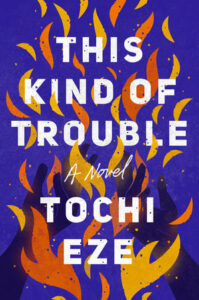I was seven years old the first time I learned you must not make water angry. My teacher, Aunt Edwina, was our housekeeper. She’d come from the village to our home in Lagos with no more than a bag of clothes and the pair of slippers that she wore. We were sitting on the dining table, my sister and I, eating a lunch of yams and egg-sauce when she appeared from the verandah, her bag clutched to her chest. She was short, with thick scattered eyebrows, long lashes. Her face was round, almost like a ball and her eyes were unfocused so that it was never clear where or what she was looking at. There was a quality to the sound of her voice, thin and raspy, as though she had been crying, or was about to cry. But what endeared her to me were the stories she told; haunted episodes she claimed to have encountered in her real life.
Article continues after advertisement
The village world she came from was no fiction, but it offered my dull childhood a world of fabulous mysteries. She knew, for instance, why the tortoise’s back was cracked, and why the snake could only crawl on its belly. She sang to us in Igbo, then interpreted the meaning in an English that was sometimes too broken to put back together. On many nights, my sister and I would sit on the bed in our shared room, our limbs folded, bodies leaning into each other, and we would demand that Aunt Edwina tell us another story, and another story, and another story.
*
We had a well at the back of our compound which was used when power was out, and the taps had stopped running. It was one such day during our afternoon play that I received the water lesson from Aunt Edwina. I had walked to the well and climbed over its protective fence, my shoulders lurched forward, and my eyes squinted as I peeped into its black bottom. Aunt Edwina saw me and screamed, then cried then hurled me away even though I was almost as tall as she was.
I understand now that all literature must be translated; that a good story invites us into the unfamiliar, the mysterious.
Then she told the water story. You must not make the water angry, she said. You must not trouble her when she sleeps. If she calls you, you must not answer. If she calls you, it is because she is hungry. She told a story about a girl in the village who went to the stream to fetch water, but the girl decided to linger by the stream and play. This girl, perhaps an anecdote for all little girls, had been warned by her elders about the water’s vexations and hunger, but she would not listen. While the girl kicked and laughed, the water, stirred from its sleep, latched on to her ankle and then swallowed her whole. I was spellbound. I also instinctively understood then that I would not provoke the water again.
*
The Igbos have a tradition of sharing such tales under the moonlight. They are oral, communal and unstable; reshaped with every retelling. They instruct, entertain and archive traditions. When Aunt Edwina took on the role of a griot with my sister and I, these tales became my earliest encounters with narrative possibility, and ultimately, they spilled into my craft in global anglophone fiction writing—i.e., the oral traditions I inherited, and the textual traditions I’ve been trained to master. The lawyer in me is drawn to the social realist novel as a genre, but the seven year old protégé of Aunt Edwina cannot help but build from the speculative logics of myth.
For me, myth is not just fabrication or metaphor, it is method and craft. It is my way of improvising through memory and cultural inheritance to tell stories where the setting is not just historical backdrop, but structures the reality of the characters itself. Myth is not just ornament, it is ontology. In my debut novel, This Kind of Trouble, I write about mental illness, but parallel it with curses and ancestral hauntings. When an early reader asked me if the novel’s premise was madness or spirituality, my answer was: both.
The first story I published in the US was about a family whose daughters were plagued by bad luck and no marriages. Even in that story with its world of ritual and self-making, I draw from the mythical world-making I inherited. Shortly after publication, a literary agency asked for a draft of my manuscript. I was ecstatic and sent her pages set in colonial Igboland, a world made up of people whose traditions are punctuated with myths and speculative juju-ism. The rejection call was kind but exacting—we do not see ourselves in these stories, they explained.
I think often about that conversation and about what it means to read literature through the lens of one’s singular vision of the world, and I understand now that all literature must be translated; that a good story invites us into the unfamiliar, the mysterious. I admit that stories do not always have to be inherently universal, but they can challenge us to think about what makes a world seem real and meaningful. In African storytelling traditions—in Igbo cosmology—the dead speak, ancestors break kola and drink alcohol, they receive offerings. I now know that there is a mythmaking and myth-believing partnership that must happen for the magic of fiction to materialize for me. This is what I aspire to when I sit down to write. I want to create a world that is not suited for specific audiences, but one that is open to readers willing to believe.
*
Shortly after my water lesson, my father arranged for a trip to the beach so we could get to know the woman he was courting. My sister and I shrieked as we climbed into my father’s cream-colored Peugeot. We ran on the beach, wondering how far we could go to escape the watchful gaze of the adults. “I wonder what’s on the other side of the water,” I said to my sister, and she pushed me and shrieked, then I laughed, and she laughed, and we continued running. My father’s would-be wife, riding a horse, invited us to join. But I screamed in fear and ran to the safe haven of Aunt Edwina by the tent. I can still smell the horse, and taste my tears and feel the sand between my toes. Yet, in the version of this story that my sister recalls, there is no horse. We have argued a small argument about this. But it doesn’t matter. We both agree on what happens next: The water wakes up. It wakes up and it comes for us.
I want to create a world that is not suited for specific audiences, but one that is open to readers willing to believe.
Before the water came for us, I built sandcastles, then smashed them, displeased by my own creation. I walked towards the ocean again, propped by Aunt Edwina’s encouragement. Around us, people threw balls and dived into the waves, then my sister pressed her mouth to my ears and whispered that she peed in the water. My father’s to-be wife decided to take a photograph before we left and so my sister stood to her left, while I stood to the right, shooting my hips out in my fiercest pose. I do not know what came first: the click of the camera, or the wave that crashed into us from behind. But this is what I know: the water came. It claimed us as it withdrew.
*
It took me years to understand that Aunt Edwina’s stories were born out of her own longing for home, that her fabulous encounters with goats and turtles were her own way of constructing an elsewhere. It was her language of hope. Myth, for her, was a kind of return, a possibility for reclamation. And it has become, for me, a writer working from the diaspora, the right to have a cultural inheritance.
The practice of mythmaking is encoded in memory and the beach experience has since become its own myth in our family, changing with the years and each retelling. I do not remember much of being under water, even though I remember nearly everything that happened before it. I do, however, have that one moment that has traced me into adulthood. Me, thinking to myself: Is this how I am going to die? Every time my father’s wife recounts the incident, she remembers it a little differently. There was a commotion, she says. The wave took lots of people. No, you lost your balance. It was your sister the water took.
I do not often return to my childhood with nostalgic fantasy, but every so often, I think about the chaos of misremembering, and then of my precious Aunt Edwina since married with four teenage boys; I wonder if she still tells stories, and if she tells one about me. But most of all, I am grateful for what she gave me; the sense that a story could move beyond lived experience, beyond the familiar, but never beyond imagination.
__________________________________

This Kind of Trouble by Tochi Eze is available from Tiny Reparations Books, an imprint of Penguin Publishing Group, a division of Penguin Random House, LLC.
